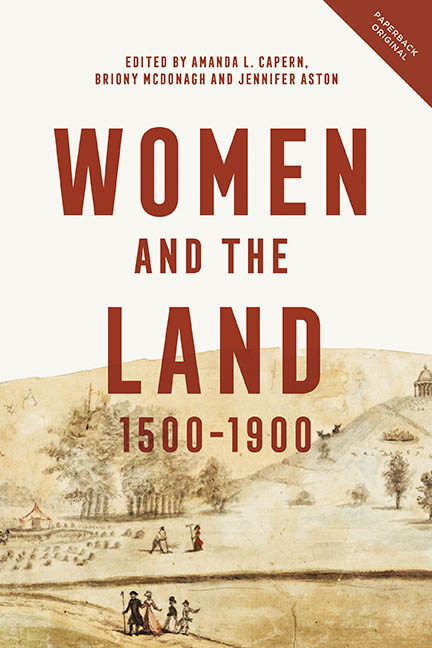Book contents
- Frontmatter
- Contents
- List of Illustrations
- List of Contributors
- Introduction: Women, Property and Land
- 1 Women, Work and Land: The Spatial Dynamics of Gender Relations in Early Modern England 1550–1750
- 2 Spinsters with Land in Early Modern England: Inheritance, Possession and Use
- 3 Becoming Anne Clifford
- 4 The Heiress Reconsidered: Contexts for Understanding the Abduction of Arabella Alleyn
- 5 From Magnificent Houses to Disagreeable Country: Lady Sophia Newdigate's Tour of Southern England and Derbyshire, 1748
- 6 On Being ‘fully and completely mistress of the whole business’: Gender, Land and Estate Accounting in Georgian England
- 7 Negotiating Men: Elizabeth Montagu, ‘Capability’ Brown and the Construction of Pastoral
- 8 Women's Involvement in Property in the North Riding of Yorkshire in the Eighteenth and Nineteenth Centuries
- 9 Invisible Women: Small-scale Landed Proprietors in Nineteenth-century England
- 10 More than Just a Caretaker: Women's Role in the Intergenerational Transfer of Real and Personal Property in Nineteenth-century Urban England, 1840–1900
- Afterword
- Select Bibliography
- Index
- PEOPLE, MARKETS, GOODS: ECONOMIES AND SOCIETIES IN HISTORY
3 - Becoming Anne Clifford
Published online by Cambridge University Press: 21 March 2020
- Frontmatter
- Contents
- List of Illustrations
- List of Contributors
- Introduction: Women, Property and Land
- 1 Women, Work and Land: The Spatial Dynamics of Gender Relations in Early Modern England 1550–1750
- 2 Spinsters with Land in Early Modern England: Inheritance, Possession and Use
- 3 Becoming Anne Clifford
- 4 The Heiress Reconsidered: Contexts for Understanding the Abduction of Arabella Alleyn
- 5 From Magnificent Houses to Disagreeable Country: Lady Sophia Newdigate's Tour of Southern England and Derbyshire, 1748
- 6 On Being ‘fully and completely mistress of the whole business’: Gender, Land and Estate Accounting in Georgian England
- 7 Negotiating Men: Elizabeth Montagu, ‘Capability’ Brown and the Construction of Pastoral
- 8 Women's Involvement in Property in the North Riding of Yorkshire in the Eighteenth and Nineteenth Centuries
- 9 Invisible Women: Small-scale Landed Proprietors in Nineteenth-century England
- 10 More than Just a Caretaker: Women's Role in the Intergenerational Transfer of Real and Personal Property in Nineteenth-century Urban England, 1840–1900
- Afterword
- Select Bibliography
- Index
- PEOPLE, MARKETS, GOODS: ECONOMIES AND SOCIETIES IN HISTORY
Summary
Lady Anne Clifford (1590–1676) is best known for her decades-long battles to inherit the huge northern estates of her father, George Clifford, 3rd earl of Cumberland. In 1643 she finally outlived all those who stood between her and her inheritance. Her Great Books of Record and her Great Picture both celebrated what she saw as the providential justification of her resistance to the authorities, including a king, archbishops, great lords, a husband and father, who had continually demanded she relinquish her claims. In 1643 she triumphed over these men, but could do little to insist upon what she believed to be her divinely ordered destiny, to embody her lordship over these lands in Westmorland and north-west Yorkshire. Yet, through her work on the Great Books of Record, with its six hundred year history of the Cliffords in the region, Anne Clifford derived a firm sense of her rights and a clear understanding of the challenges facing her. Her experience of regal courts, especially that of Elizabeth I, reminded her of the necessity of display and reciprocity. Watching Charles I's will flouted and the country devolve into civil war taught her the dangers of losing authority. These, along with her wide reading in history, theology, philosophy and literature, contributed to the strategies she developed for exercising her own authority in what she always termed ‘the lands of mine inheritance’. When she arrived in the north in 1649 she faced a number of challenges but was determined to undermine those individuals who claimed a separate authority in the region. In the following years, often facing down great difficulties, she established a network made up of people and places, movement and action, which allowed her authority to circulate in the north and to radiate southward, including to London, and even in the halls of Charles II's government.
Anne Clifford's twentieth-century biographer, Richard T. Spence, remarked that Anne Clifford enacted the role of ‘surrogate northern royalty’ in Westmorland. In this he was acknowledging a tradition that had survived for over four centuries. In 1691 Anthony Wood reminded his readers that ‘it must be noted that this Anne Countess of Pembroke was the same person who lived like a Princess’. Later writers reveal that this reputation did not diminish.
- Type
- Chapter
- Information
- Women and the Land, 1500–1900 , pp. 77 - 99Publisher: Boydell & BrewerPrint publication year: 2019



